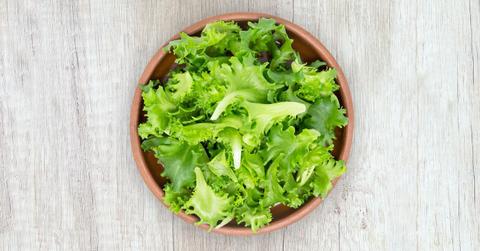Lettuce Nutrition — Complete Data of All Nutrients

Aug. 2 2023, Published 4:09 a.m. ET
Introduction
Lettuce is a versatile leafy green vegetable used in salads and various dishes for centuries. It adds freshness and crunch to your meals and different nutrients, contributing to overall health and well-being.
We will discuss lettuce nutrition facts and micronutrient data.
Nutrition
The nutritional values are for raw lettuce.
Calories
Lettuce calories are equal to 15 per 100g and 5.4 per serving size (36g), which means that lettuce is considered a low-calorie food (1).
Vitamins
Lettuce is high in Vitamin A, containing 7405IU per 100g.
The recommended daily amount for Vitamin A is around 2000-3000 IU; 100g of lettuce fully covers your daily need.
Lettuce is also rich in Vitamin C, falling in the range of 25% of foods as a source of Vitamin C.
Lettuce has a moderate amount of vitamin B9 (folate), Vitamin K, and Vitamin B6 (1).
Minerals
Lettuce has a high amount of calcium (36mg per 100g), manganese (0.25 mg per 100g), potassium (194 mg per 100g), and iron (0.86 mg per 100g).
Lettuce provides moderate choline, magnesium, phosphorus, and sodium (1).
Glycemic Index
The glycemic index of lettuce is equal to 32, which means that lettuce is low-GI food (2).
Acidity
Food acidity measures food's potential to affect the blood's pH. Lettuce is alkaline and has acidity (based on PRAL) equal to -3.1 (2).
Carbs
Half of the lettuce carbs are net carbs; 1.57g per 100g. The rest are fiber (1.3g) and other sugars (glucose, fructose) (1).
Cholesterol
Lettuce has no cholesterol (1).
Oxalates
Even though leafy green vegetables are high in oxalates, the number of lettuce oxalates equal to 16mg per 100g is considered low (2).
While oxalates are generally considered safe for most people, they can pose a concern for individuals prone to kidney stones or those with certain medical conditions.

Flavonoids
Lettuce has a high amount of phytochemicals. These molecules, which include glycosylated flavonoids, phenolic acids, carotenoids, vitamin B groups, ascorbic acid, and tocopherols, are essential bioactive nutritional components with numerous health benefits.
Quercetin, isorhamnetin, kaempferol, and anthocyanins are the main flavonoids in lettuce, which possess several medicinal benefits, including anticancer, antioxidant, anti-inflammatory, and antiviral properties (3).


